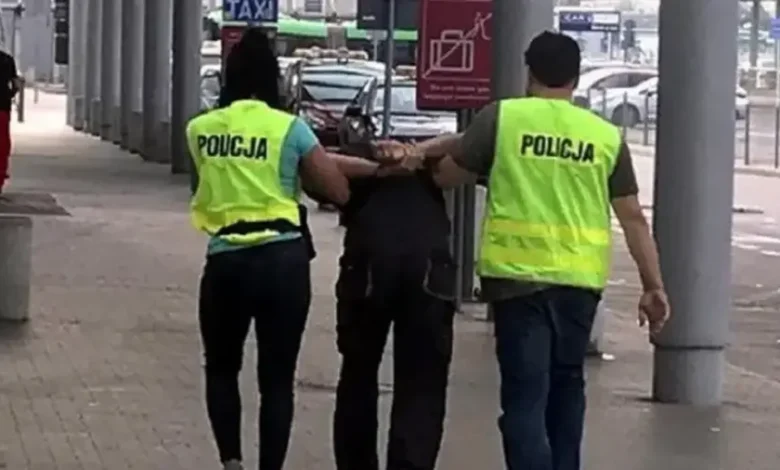Police detention abroad: what to do for Ukrainians in Europe

Living abroad is not only adaptation to a new language, culture and lifestyle, but also the need to understand the rules of the country in which you are staying. For Ukrainians who ended up in Europe after the start of the war, ignorance of local laws can have serious consequences. Situations when you are stopped or detained by the police are especially critical. Even if you have not broken the law, found yourself in a random situation, witnessed a conflict, or simply looked like someone who is wanted, an arrest may occur. And a lot will depend on how you behave in the first minutes: further legal status, the ability to avoid unnecessary charges, access to a lawyer, as well as reputation and even safety.
This especially applies to Ukrainian refugees who do not always have a perfect command of the host country’s language, do not know local legislation, and do not have legal support or social contacts. They may be more vulnerable in the face of enforcement or accusations, so a clear understanding of their rights and responsibilities is extremely important.
What is detention and how does it differ from arrest
In most countries of the European Union, detention (on-the-spot detention or temporary restriction of liberty) is not automatically an arrest. This is the first stage of law enforcement actions, which can last from several hours to several days, depending on the reasons. During the detention, you should be informed about the reason, given the right to a lawyer, an interpreter and the right to contact the consulate of Ukraine.
An arrest is already an official decision of a court or an investigating judge on further detention. Hours or days can pass between detention and arrest, during which a person is entitled to protection.
How to behave during detention
- Keep calm. Even if you are detained unfairly, in a stressful situation or unexpectedly, keeping a cool head is your mainstay. Loud protests, attempts to break out or run away, aggression, insults to the police only make the situation worse.
- Do not resist. Attempting to physically obstruct an arrest is the fastest way to get criminal charges. Even passive resistance (sitting on the ground, not leaving voluntarily) can be qualified as opposition to the police.
- Do not sign any documents without an attorney. Even if they tell you that “it’s just a protocol” or “the signature is not important here.” In countries with other legal systems, a signature may have legal consequences that will be very difficult to reverse.
- Do not give explanations without an interpreter. If you do not speak the language of the country at a high level, insist on an interpreter. Explanations written with mistakes or incorrect translation can be used against you.
- Do not plead guilty or sign statements against yourself or others. In every democratic country there is a principle: a person has the right not to testify against himself. If you are pressured, blackmailed or tried to intimidate – demand a lawyer immediately.
Basic rights abroad
After the actual arrest, the first thing the police should do is clearly state why you were arrested. A person cannot be under the control of law enforcement officers without an explanation of what act they are accused of. This is a basic right enshrined in the European Convention on Human Rights. If the police remain silent, evade explanations, or formulate the reason too vaguely, you have every right to demand a specific answer.
The second key element of protection is the right to a lawyer. In no country of the European Union or the Schengen area, there is no legal basis for conducting an interrogation or drawing up procedural documents without access to protection. Even if you don’t have the funds or are only in the country for a few days, the state is required to provide a public or appointed attorney. Any actions of law enforcement officers without the participation of a defense attorney may be invalidated. If the lawyer is not called, you have the right to refuse any explanations and signatures until his arrival.
It is equally important to know that you have the right to full language assistance. This means that you do not have to answer the police’s questions in the language of the country if you do not speak it confidently. You must not translate yourself or accept the help of random persons. The translator must be officially engaged or authorized by the relevant authorities. Your testimony should be translated completely, accurately and without pressure. And if this does not happen, you have the right not to answer any question.
Separately, you should know about the right to contact the consulate of Ukraine. This is an internationally recognized mechanism for the protection of foreigners in case of detention or arrest. You have the right to demand that the law enforcement agencies of the country immediately notify the diplomatic representation of Ukraine — the embassy or consulate — of your detention. This is not a “request” – it is a legal guarantee established by the Vienna Convention on Consular Relations. After notification, the consular office must contact you, provide advice, and in difficult cases, arrange a lawyer or contact with relatives.
And one last thing that is often overlooked: you have the right to tell at least one close relative or person you trust about your detention. If you are detained at a police station or border crossing, you can request one phone call. This is not a privilege – it is an element of basic procedure that must be ensured unless you pose an immediate threat to the environment or the investigation. Refusal to provide contact with the family is a direct violation of individual rights.
These rights apply regardless of your status in the host country—temporary protection, tourist, student, transit rider, or person awaiting status. All of them are protected by international agreements that are in force within the European Union, as well as in most countries that have joined the relevant international conventions.
What to do after detention: step-by-step actions
- Remember all the details of the detention. Who exactly detained you (name of the police, name of the employee, badge number, uniform), date, place, time, witnesses. A lawyer may need all this.
- If possible, record the detention on video. In many EU countries, citizens have the right to film police actions, as long as they do not obstruct their execution. Video is the best evidence of wrongdoing.
- If allowed, ask eyewitnesses to become witnesses. People nearby can confirm that you did not resist, did not violate public order, etc.
- Immediately contact the consulate of Ukraine. The Ukrainian embassy or consulate has the right to be informed about your detention and can provide legal and practical support. The hotline of the Ministry of Foreign Affairs of Ukraine works around the clock: +38 044 238 15 88
- Insist on the participation of a lawyer in every procedure. During the interrogation, processing of documents, medical examination, search – your protection must be present.
What to do after dismissal
If you were released without charge, be sure to collect:
- copies of all documents signed;
- data about the lawyer;
- recordings from cameras, if any;
- witness contacts.
If the case is not closed, check your case status regularly or contact your local law enforcement agency for help. If your rights are violated, contact the ombudsman or human rights centers.
Features for refugees and persons with temporary protection
Ukrainians who have the status of temporary protection are protected not only by the host state, but also by international law. You cannot be deported without a court order, and even if you have committed an offence, you must be dealt with on an individual basis.
In addition, detention in itself is not grounds for revoking temporary protection status. If you were detained due to an administrative violation – for example, appearing drunk, arguing at the station, invalid ticket – this does not automatically mean the loss of the right to residence.
Detention abroad is a difficult situation, but not hopeless. It is important not to panic, not to make decisions under stress, not to sign any documents without consultation and not to neglect the right to legal protection. Each country has its own rules, but all states that have signed international agreements are obliged to adhere to basic standards for the protection of foreign nationals.
If you are abroad as a refugee or just a citizen of Ukraine, remember the key thing: you have the right to protection. And this right must be used. In case of doubt or danger, call the consulate, seek a lawyer, do not remain silent and do not remain alone. Timely competent action often saves not only reputation, but also freedom.





